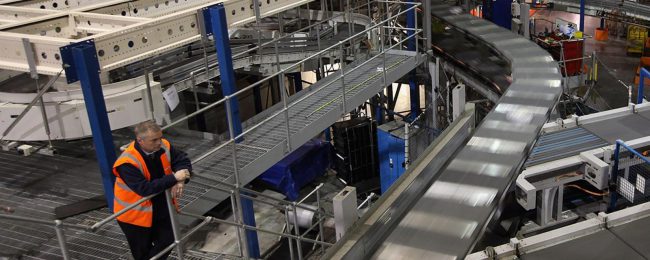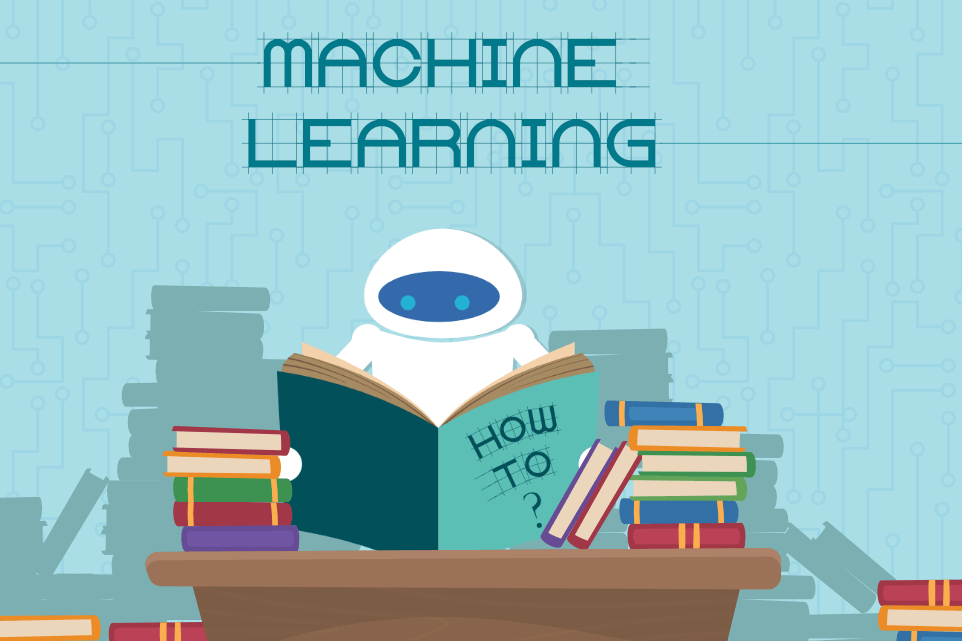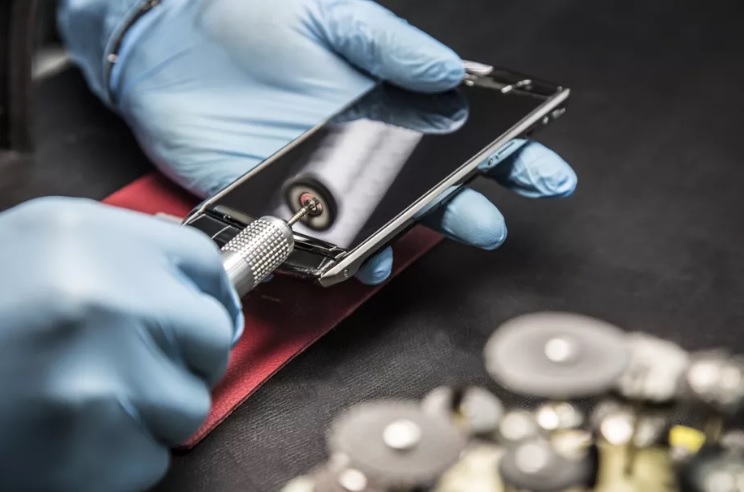Expert opinion: the world after automation?
 Source:
Source:
The Soft, flexible fingers are extended to delicately remove the Apple from the shelf and gently place them in the basket. The task is then repeated with lemons, then with pepper. Fingers never complain and never tire of. More and more companies are turning to smart cars to save on slow and costly work in the face of people. Automation. What is it? What does it mean for your work?
The Prototype of the manipulator described above — is the hand of development of Ocado, the British online supermarket. The irregular shape and thin skin of those mediocre products say that they are usually Packed with people on the Ocado warehouse. But the company uses robotic technology to help these people not only safely handle products, but also to do it faster and cheaper for the company.
Ocado is not the only company who prefer automated work. The same is happening in hospitals, law firms on the stock market. A list of going long.
The Question is how this affects working people. For you, for example, how might this affect?
We often hear about how grim the future robots stealing our jobs, but is it? Who is at risk? How will your workplace in five years?
The Answers may surprise you.
theAt risk — middle class
Research suggests that 47% of people working in the U.S., can be replaced by machines, and in the UK under threat can be about 35% of jobs in developing countries, the threat level even higher, because two-thirds of jobs can be automated.
But the machines are stealing jobs — it is not new. "Automation has already happened before," says bhagwan Chaudhry, Professor of Finance at the University of California in Los Angeles. Chaudhry points to the shifts that have occurred in factories during the industrial revolution, when automated looms and other machines took over the work of weaving from the people.
What has changed in this time? "It will affect not only blue collar, but many white people," says Chaudhry. Under the "blue collar" refers to the working class, under the white — civil servants, bureaucrats, administrators, managers.
We Often believe that the lowest paid jobs with low skills at risk more than others. For example, warehouse workers or cashiers. However, automation can also affect people with average income, such as clerks, cooks, office workers, security guards, clerks, inspectors.
It is Understood that under the line of fire people are concerned. "The concerns relate not only to the transition period," says Carl Benedikt Frey, co-founder of the Oxford Martin Programme on Technology and Employment. "Most of the jobs that will be automated, require different skills, unlike the newly created. It will be important to ensure that unemployed people could find something to do".
So, should companies that seek to automate, bear the moral responsibility to assist their staff to learn new skills?
theCheck future
The Answer may affect not only the company — the answer may begin with a school.
Our modern structured education, can lose meaning in a world where technology is changing so quickly.
"the Concern is that we do not update our educational, educational and political institutions to keep up," says Eric Brynjolfsson, Director of the Initiative on the digital economy Massachusetts Institute of technology. "We may eventually throw many people."
Brynjolffson and Paul Clarke, CTO of Ocado, agree that education in schools and colleges should better prepare students for a world in which artificial intelligence and robotics will be widely distributed.
In the workplaces of employees also will be required to upgrade skills instead of using the same throughout his career.
"the Difference between work and learning may be vague," says Chaudhry. "Currently, we are accustomed to separation, when working no need to learn, and those who are learning, not working. We need to think about how to move away from the traditional five-day working week to one where I spend 60% of their time doing their work and 40% on continuous training".
For most of us it may be a decisive factor in the thinking.
A Study by management consultants McKinsey and Company showed that less than 5% of the professions can be fully automated with existing technology. Just because our jobs are too diverse and changeable, so that the robots could perform all the tasks.
Instead, according to their forecasts, about 60% of occupations will be automated by a third. So, most of us will be able to cling to their jobs, but will change the process of our work.
theRobots will complement, not replace
Learning how to work side by side with robots, will be essential.
"there Are times when the machines take over part of the repetitive work to liberate people so they can perform other, more useful aspects of his work," explains James Munnik, a senior partner at McKinsey, who spent most of his research in the area of influence of automation. "It can significantly change the determination process of wages, because the machine will do all the hard work. It also follows that more people will be able to do this job with the help of technologies, so the competition will increase."
There are also wider problems. With a decrease in the income of the middle class, the government can deal with such fundamental issues as loss of taxes and a dissatisfied electorate.
Fortunately, there are many cases that machines still do not.
One good example was the work of researchers from Singapore, who are trying to teach two Autonomous robotic manipulator to assemble flat chairs from IKEA. Despite the use of modern equipment, machines cannot cope with the simplest problems.
Even the isolation of the different objects from the chaotic mix of parts is a complex task for robots. In recent tests the two robots took more than six minutes to successfully insert a piece of pile in one of the legs of the chair.
And this is only one part of the piece of furniture. "The real problems start when you want the robot has collected several pieces of furniture. The robot could collect the chest of drawers IKEA, but will not be able to collect a wardrobe from the same series, since the details will be different, even if some of the Assembly steps remain the same. Humans do not have a problem."
thethe Advantage
From the flexibility to the best personal qualities will always be things that we are better than robots.
"as soon as we automate repetitive work, we see a growing demand for creative skills," says Brynjolfsson. "We also see a growing demand for people with social skills, interpersonal communication skills, which nurture, heal, teach, impose their beliefs, have negotiation skills and good selling."
Frey believes there are several areas in which people will benefit.
"the First is social interaction," says Frey. "If you think about the diversity of complex social interactions that we encounter every day when negotiating or trying to convince people to help others or to take care of customers... We manage the teams and all that. It's amazing what computers can substitute for workers who do all this".
Another — creativity. Computers are perfectly cope with the problems and not bored doing repetitive actions. However people find this tedious monotonous work.
The Initiative at mit have set the goal for $ 1 million, aims to encourage businesses to use these "human traits" along with the technology.
"the Amount that we currently paid to nurses and caregivers for the elderly, very low," says Manyika from McKinsey. "Similarly, there are many artistic and creative works that are never paid. The challenge is how to pay for and appreciate the creative work on the merits, because the machine will never be capable of it fully".
Alex Harvey, scientific Director at Ocado Technology, which develops software and technology for the retail division of the company, said that the world was designed and built for people, and force the robots to operate in this challenging natural environment is a serious technical problem.
One of the projects Ocado is the robot assistant maintenance called SecondHands. It shows how people and robots could work together.
"for Example, he has the ability to raise things to a higher altitude than humans," explains Harvey. "It's a pretty simple robot, in terms of its behavioral repertoire, but it can form a great team, in which man technician will be the leader and they will be able to use the muscle strength of the robot".
But the closer humans and machines will work together, the darker will be the ethical side.
theethical Issues
About 1.7 million robots are already being used worldwide, but most often in industrial environments, where people are virtually off-limits. Numbers are rising, and the roles performed by the robots, too. It turns out, people will have to work with them side by side, and the risk will increase accordingly.
"there Must be more transparency so we can understand how these things do what they do and how they behave," says MADI Delvaux, Vice-Chairman of the Committee on legal Affairs of the European Parliament.
Not...
Recommended
To work with PDF difficult? Try this app
PDFelement — a powerful processor to work with PDF Many of us somehow have to work with documents in PDF format. One needs it in the office, others just prefer to share documentation in PDF format as it is convenient to use and economical in ba...
How to get started with the training of neural networks
No machine learning can not work none of the neural network. a few years ago neural networks were something outlandish. Now this tool is mastering more and more people. And this industry is evolving at an incredible pace: recently, the neural network...
Why China began to raise pigs the size of a polar bear?
Pigs can weigh more than a ton In the article about the successful establishment we mentioned that is one of the largest consumers of pork meat. However, at the moment, Asia is widely distributed so-called African swine fever. This disease is not for...
Related News
Seven predictions for the future from bill gates
the Nostradamus of the 21st century, bill gates, has repeatedly been right in their predictions concerning global trends, social changes and technological advances. What, in his opinion, will happen in the next 20 years? In their ...
Virtual reality is steadily gaining popularity
Slowly but surely, virtual reality technology is gaining momentum. More and more people are interested in buying a VR device for entertainment, movies, education, or just out of curiosity. Three major player in the VR market has r...
Samsung could overtake Intel and become the chip maker No. 1
the South Korean tech giant Samsung is aiming for a leading manufacturer of microprocessors in the world, which is currently owned by the American Corporation Intel. For Koreans it would be a major victory, as this is its leading ...
Steve Ballmer found out where the money of American taxpayers
do You still remember ? The slightly crazy bald guy, who loudly yelled, waving his arms and jumping around the stage during press conferences Microsoft. It was hard to believe that he heads a huge Corporation with multibillion dol...
Switch became the fastest console in history, Nintendo
a Game console went on sale recently, but already it is now clear that the console is literally flying off the shelves of stores worldwide. The Japanese manufacturer has made a bet on the hybridity of the new platform that allows ...
Switch became the fastest console in history, Nintendo
a Game console went on sale recently, but already it is now clear that the console is literally flying off the shelves of stores worldwide. The Japanese manufacturer has made a bet on the hybridity of the new platform that allows ...
Manufacturing the PlayStation 3 in Japan will soon end
the Game console of new generation PlayStation 4 from the Japanese company Sony has 3 years old, but the production of the previous generation home gaming console – the PlayStation 3 is still ongoing. And yet all good things soone...
Vertu found a new owner for only 50 million British pounds
British manufacturer of luxury mobile phones Vertu changed hands again. This is the third time the company changes hands from the moment Nokia decided to sell this unit in 2012. According to the newspaper The Telegraph, the compan...
Aquarium animals: what could be modular Ara smartphone from Google?
what a smartphone? To call, take photos, take you to the Network. Boring. At the end of 2015 the secret Google group working in advanced technology and projects, looking for ways to prove that the Project Ara — modular phone relea...






























Comments (0)
This article has no comment, be the first!